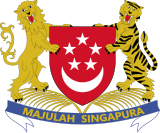
Singapore is a parliamentary representative democratic republic in which the president of Singapore is the head of state, the prime minister of Singapore is the head of government, and of a multi-party system. Executive power is exercised by the Cabinet from the parliament, and to a lesser extent, the president. Cabinet has the general direction and control of the government and is accountable to Parliament. There are three separate branches of government: the legislature, executive and judiciary abiding by the Westminster system. Singapore has been described as being a de facto one-party state.

Sellapan Ramanathan, often known as S. R. Nathan, was a Singaporean politician and civil servant who served as the sixth president of Singapore between 1999 and 2011. Nathan won both the 1999 presidential election and the 2005 presidential election thanks to an uncontested walkover due to ineligible candidates. He was the longest-serving president in Singapore's history and the only one to serve two full terms.

The president of the Republic of Singapore is the head of state of Singapore. The president represents the country in official diplomatic functions and possesses certain executive powers over the Government of Singapore, including the control of the national reserves and the ability to revoke and appoint public service appointments.
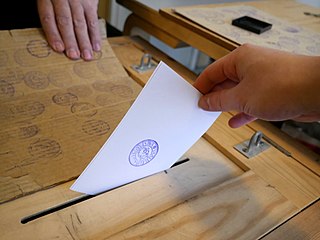
A presidential election is the election of any head of state whose official title is President.

Benjamin Henry Sheares was a Singaporean physician and academic who served as the second president of Singapore from 1971 until his death in 1981.

There are currently two types of elections in Singapore. Parliamentary and presidential elections. According to the Constitution of Singapore, general elections for Parliament must be conducted within three months of the dissolution of Parliament, which has a maximum term of five years from the first sitting of Parliament, and presidential elections are conducted every six years.

The Istana is the official residence and office of the president of Singapore. The palace is open to the public during scheduled public holidays and is where the president receives and entertains state guests.
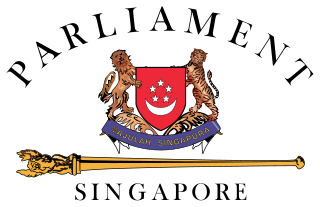
The Parliament of Singapore is the unicameral legislature of the Republic of Singapore, which governs the country alongside the president of Singapore. Largely based upon the Westminster system, the Parliament is made up of Members of Parliament (MPs) who are elected, as well as Non-constituency Members of Parliament (NCMPs) and Nominated Members of Parliament (NMPs) who are appointed. Following the 2020 general election, 93 MPs and two NCMPs from three political parties were elected to the 14th Parliament. Throughout the sitting of Parliament, nine NMPs are usually appointed by the president on a biennial basis.
The following lists events that happened during 1970 in Singapore.
The following lists events that happened during 1967 in Singapore.

The following lists events that happened during 1965 in Singapore.
Yusof bin Ishak was a Singaporean journalist and senior civil servant who served as the first president of Singapore between 1965 and 1970.
The following lists events that happened during 1959 in Singapore.
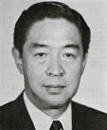
Yeoh Ghim Seng was a Singaporean politician who served as Speaker of the Parliament of Singapore between 1970 and 1988.
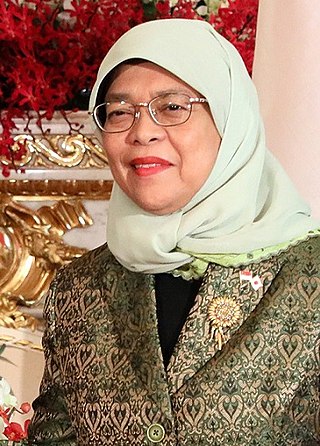
Halimah binti Yacob is a Singaporean politician and lawyer who served as the eighth president of Singapore from 2017 to 2023. Halimah won in the 2017 presidential election in an uncontested walkover due to ineligible candidates. She is the first female president in Singapore's history.

Adrian Tan Cheng Bock is a Singaporean politician and medical doctor.

Presidential elections were scheduled to be held in Singapore on 13 September 2017. Following amendments to the Constitution of Singapore, which resulted in the elections being reserved for candidates from the Malay community, incumbent president Tony Tan, who had been elected in 2011, was ineligible to seek re-election.
The spouse of the president of Singapore is sometimes referred to as the first lady or first gentleman, although it is a courtesy term not enshrined in the Constitution. By tradition, an official portrait of the spouse of the president of Singapore is prominently displayed in government buildings alongside the portrait of the president.

Indirect presidential elections were held in Singapore on 30 December 1970, following the death of the incumbent, Yusof Ishak. The election took place during a sitting of Parliament on 30 December 1970 where 54 members were present and 4 members were absent.
Indirect presidential elections were held in Singapore on 6 November 1974.
